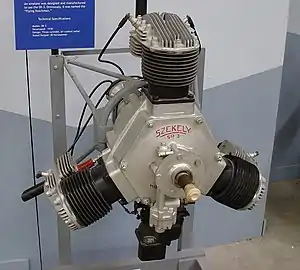| Model V Flying Dutchman | |
|---|---|
 | |
| Role | Sportplane |
| National origin | United States |
| Manufacturer | Szekely Aircraft and Engine Company |
| Designer | Peter Altman |
| Introduction | 1928 Los Angeles International Aircraft Show |
| Produced | 1928–1929 |
| Number built | 21 |
| Developed from | Niles Aircraft Corporation Williams Gold Tip |
The Szekely Model V Flying Dutchman is a single seat sport aircraft that was built by the aircraft engine manufacturer Szekely in Holland, Michigan in 1928–29.[1]
Development
The Flying Dutchman was designed in 1927 at the University of Detroit by professor Peter Altman.[2] The aircraft was originally marketed by the Niles Aircraft Corporation as the Williams Gold Tip, powered by a three cylinder Anzani engine. The rights were purchased by Szekely to produce the aircraft using its own engine design.[3] An airport was built in Holland to accommodate the company, opening on 28 August 1928, acquiring the name Szekely Airport in 1929. Szekely claimed a production capacity of 24 planes per week, though only 21 aircraft were produced in total. The Szekely company filed for bankruptcy in March 1932, and the factory assets were purchased by Michigan Bumper in 1936.[4]

Design

The Flying Dutchman is a single place, low wing, open cockpit monoplane with conventional landing gear and a 3-cylinder Szekely engine. The fuselage was made of welded steel tubing with aircraft fabric covering.[5]
Operational history
A Flying Dutchman was featured in the 1938 film Men with Wings.[4]
Variants
- Niles Aircraft Corporation Williams Gold Tip
- Anzani 3 cylinder power
- Szekely Flying Dutchman
- Szekely SR-3 3 cylinder power
Specifications (Flying Dutchman)

Data from Aeronautics
General characteristics
- Crew: 1
- Length: 18 ft 6 in (5.64 m)
- Wingspan: 26 ft (7.9 m)
- Gross weight: 850 lb (386 kg)
- Powerplant: 1 × Szekely SR-3 3 Cylinder Radial, 40 hp (30 kW)
- Propellers: 2-bladed
Performance
- Maximum speed: 83 kn (96 mph, 154 km/h)
- Stall speed: 26 kn (30 mph, 48 km/h)
See also
Aircraft of comparable role, configuration, and era
References
- ↑ Manufacturers Aircraft Association, Manufacturers Aircraft Association, Inc., New York, Aeronautical Chamber of Commerce of America, Aerospace Industries Association of America, Aircraft Industries Association of America. The Aerospace year book, Volume 1930.
{{cite book}}: CS1 maint: multiple names: authors list (link) - ↑ George Newman Fuller, Lewis Beeson, Michigan Historical Commission (1937). Michigan History Magazine.
{{cite journal}}: Missing or empty|title=(help)CS1 maint: multiple names: authors list (link) - ↑ Michigan Aircraft Manufacturers. p. 67.
- 1 2 Reynolds, Geoffrey (1 January 2001). "High Flying to Tailspin: Otto E. Szekely and His Troubled Aircraft and Engine Company". Review. 13 (4): 4–6.
- ↑ Aeronautics: 17. January 1930.
{{cite journal}}: Missing or empty|title=(help)